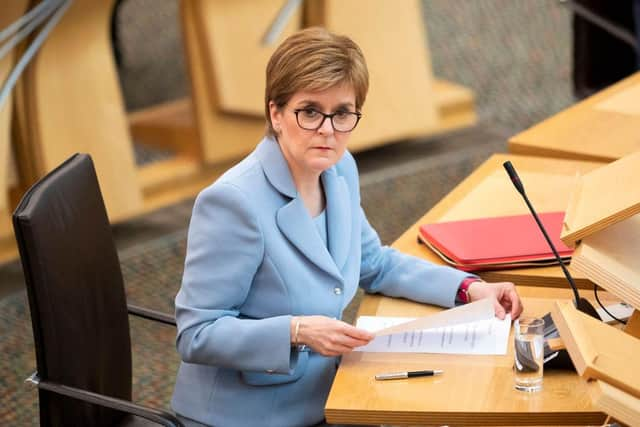Rape Crisis Scotland calls for not proven verdict to be abolished
There were 300 prosecutions for rape or attempted rape in 2019-20, of which 130 culprits were convicted, down from 142 on the previous year.
But 74 of the accused (24.7 per cent) were acquitted with a not proven verdict that is unique to Scots Law.
Advertisement
Hide AdAdvertisement
Hide AdThe figures were published in the Scottish Government’s annual Criminal Proceedings in Scotland report.
It also showed there was a decrease of 2 per cent in the number of convictions for all sexual crimes, down from 1,224 in 2018-19 to 1,204 last year.
Convictions for rape and attempted rape decreased by 8 per cent to 130 in 2019-20.
The number of alleged incidents dropped slightly, from 2426 to 2343.
Responding to the report’s publication, chief executive of the Rape Crisis Scotland, Sandy Brindley, called for “bold action” to change the justice system.


She said: “It is clear that the Scottish criminal justice system is failing the vast majority of people in Scotland who have been raped.
“Rape already had the lowest conviction rate of any crime type, to see it fall further, to only 43 per cent of cases which make it to court, is alarming.
“Almost a quarter of rape trials end in the not proven verdict, which used disproportionately in rape cases.
Advertisement
Hide AdAdvertisement
Hide Ad“Political parties, including the SNP, need to follow through on their commitments made during the election campaign to remove this confusing and redundant third verdict.
Ms Brindley added: “In March the review group chaired by Lady Dorrian, the Lord Justice Clerk, released a comprehensive report with key recommendations about how justice responses to sexual crime in Scotland could be improved.
“Acting on these recommendations must be a priority for the new Government. It is the least that rape survivors deserve.”
During the Holyrood election campaign, SNP leader Nicola Sturgeon said it was time to look at whether Scotland retains its controversial not proven verdict, as part of efforts to tackle the “shamefully low” conviction rates for rape and sexual assault.
The First Minister, who trained as a lawyer, revealed she personally had changed her mind on the issue.
Scottish Conservative leader, Douglas Ross, has also said his party “fully committed” to abolishing the verdict.
Ms Sturgeon said: “I do think it is time to look at the not proven verdict.”
Recalling when she studied law at Glasgow University, she said it had been “imprinted on my brain” that the “three totemic things” that make Scots law distinctive were the not proven verdict, the need for corroboration in trials with evidence coming from more than one source, and that there are 15 people needed to make up a jury.
Advertisement
Hide AdAdvertisement
Hide AdIn the past she said “maybe I have had a bit of a lawyer’s view” of the not proven verdict.
But she added: “The conviction rate for rape and sexual assault is shamefully low. And I think there is mounting evidence and increasingly strong arguments that the not proven verdict is a part of that.
“So I think it is something that it is time to look at.”
A message from the Editor:
Thank you for reading this article. We're more reliant on your support than ever as the shift in consumer habits brought about by coronavirus impacts our advertisers.
If you haven't already, please consider supporting our trusted, fact-checked journalism by taking out a digital subscription.
Comments
Want to join the conversation? Please or to comment on this article.